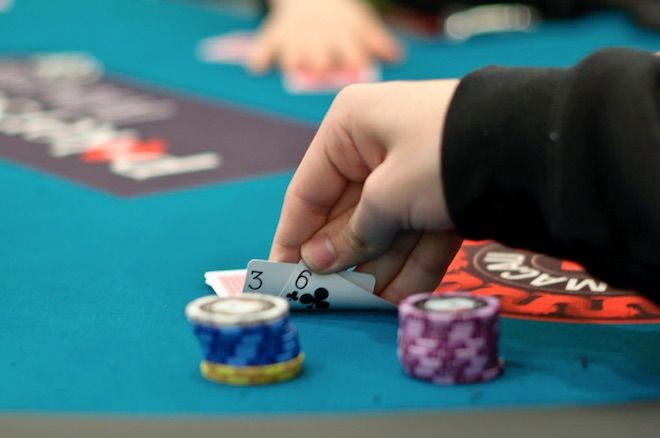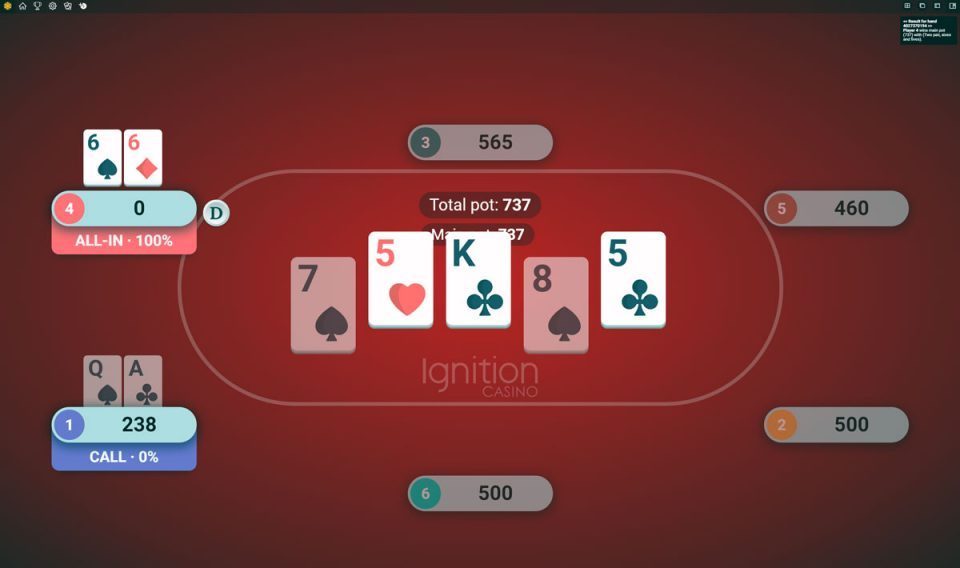Collusion Poker Meaning
Mucking is an often misunderstood part of poker. Knowing the definition and when it is both appropriate and strategically correct to muck is an important part of the game. I have researched every angle of the subject of mucking and decided to pass along my findings to you.
Collusion definition: 1. Agreement between people to act together secretly or illegally in order to deceive or cheat. Strategy (Part 1): The Study of Tactics in Poker. Created by Ragnar4 on July 22, 2009. A term to define a method in which.
What is a muck in poker? The word muck can be used as a noun or a verb. As a noun, the muck refers to the pile of discarded cards lying on the table. As a verb, mucking means to fold your hand. Most often, the word is used at the end of a hand when a player is faced with a decision on whether to show his cards or “muck” them.
Definition of collusion. Collusion is when 2 or more players at the same table conspire with each other to exploit 1 or more other players at the table. Collusion is illegal in all poker rooms, whether online or live. Collusion can take many different forms, but the goal is always to act in groups of 2 or more to give each other an unfair. It would be unrealistic to think that collusion doesn't happen a lot in online poker with all the money involved and how modern technology has become.
Simply understanding the concept of mucking in poker is one thing. Knowing how to use that information is another. To learn more about how to use the poker muck rules to your advantage at the table, read on.
Poker Muck Rules
At face value, mucking poker hands seems like a fairly straightforward concept. Even so, there are a few rules about mucking that every poker player should know:
- The muck is a one-way street: Once your cards even touch the muck, your hand is dead and cannot win. Make sure you are 100% sure you are folding before you throw those cards into the muck. Never EVER reach your hand into the muck to try to retrieve cards. This is a serious breach of the rules.
- Muck your hand correctly: The correct way to muck is to place your cards down in front of the dealer, not chuck them across the table haphazardly. Eventually, you will turn one or more cards up and annoy everyone at the table.
- Do not muck your hand out of turn: or let anyone know you plan to fold since this is a breach of both the rules and etiquette. We don’t want to unfairly give one or more players this type of information. Make sure you learn the showdown rules of poker so you know when to muck.
- Beginners should never muck their hand on the river: Even experienced players sometimes misread their cards. Throwing away the winning hand, even in a small pot, is extremely frustrating.
What Is Considered a Muck in Poker?
Mucking is the same as folding. If you place your cards on the discard pile or slide your cards toward the dealer, your hand is said to be mucked and is dead for the rest of the current hand.
Your hand can also be mucked automatically if your time bank runs out in online poker or someone calls the clock on you and you run out of time in live poker.
Can I Set My Cards down Again Once I Pick Them Up?
If you pick your cards up and then place them in front of you, that is not considered a muck. In fact, you can pick your cards up and set them down as many times as you like, as long as you do not verbally declare that you are folding or touch your cards to the discard pile.
If the Dealer Deals One of My Cards to the Wrong Person, Is It Mucked?
If the dealer accidentally gives your card to the wrong player, you should announce it immediately. If it is obvious which card was dealt to the other player, a correction can be made and the card shifted to you. However, if the other player mixed it with his other card or cards or took a look at it, the card is dead.
If you are in the blinds a misdeal would be declared and the hand restarted. If you are not in the blinds and your card is declared dead, then it would be given back to the dealer and used as the burn card for the flop.
When Can You Muck Your Hand in Poker
On every betting round you must follow the correct order of play and wait until the action is on you before you can fold or muck your hand. Showdown is the only time that a player may muck his or her hand out of turn.
When Are Your Cards Considered Mucked
There are three instances that your cards can be considered automatically mucked:

- You push your hand to the dealer
- Your cards touch the discards already mucked
- You verbally announce that you fold
Collusion Examples
Always remember, if you are in doubt about the local muck rules it is okay to ask the dealer or even the floor.
What If Someone Mucks out of Turn

If someone mucks out of turn there is no automatic penalty given to that player. However, except for at showdown, it is still a breach of poker etiquette to either muck your hand or telegraph that you are folding before the action is on you.
Players who continuously fold out of turn and become disruptive to the table for doing so, may be given a penalty by the dealer or floor at their discretion.

Can You Ever Ask to See Mucked Cards?
At showdown, any player who was dealt into a particular hand can ask to be shown any hand that was called, even if was thrown into the muck. However, this is known to be in bad form and is looked at as being extremely bad etiquette.
The only time you should ever remotely consider asking the dealer to flip over a mucked hand is if it was a huge pot and you suspect cheating or collusion.
Mucking Strategy – Deciding When to Muck or Show
First off, if you are a beginner you should always flip your hand over at showdown. Staying involved mentally all the way until the completion of the hand is important in the learning process. Always showing also prevents you from ever misreading your hand and folding the winner.
On the other hand, advanced players should never show losing cards without a very good reason. Poker is a game of information and the less you can give away for free, the better.
Look Before You Muck
To avoid silly errors, I advise getting in the habit of taking one last peek at your cards before folding. This prevents you from ever accidentally folding the winner. Even the best misread their cards from time to time.
How to Muck Your Hand Properly
Folding your cards is no time to get fancy. Just about every so-called “serious” player out there seems to want to impress everyone with their fancy mucking technique. Don’t be that person.
Fold your cards correctly by placing them face down in a neat little stack and quickly sliding them to the dealer. Dramatic, time-consuming, folding techniques will only slow down the action and actually hurt your hourly rate
Protecting Your Hand
If your intention is to keep your hand live then you should always protect your hand. Either purchase a decent card protector or place a low denomination chip on top of your cards. Otherwise, the dealer might accidentally muck your cards. This happened in a huge WSOP hand a few years ago, as shown in the following video.
Mucked Cards Shown in Online Poker
Some poker sites allow for mucked cards to be shown in the hand histories of the site whether you have “auto muck” clicked or not. This is a feature added to combat issues with cheating or collusion
I recommend using this information to your advantage when reviewing your play in your preferred tracking software program. You can see exactly what your opponents do in particular situations and gain and, as a result, optimize your lines.
Related Questions
In Online Poker What Is Auto Muck? Many online poker sites have a feature where you can automatically muck losing hands at showdown. I recommend using this feature if the site you play on offers it. Not only does it speed up play, but it ensures that your hand gets mucked without giving away unnecessary information.
What is a dead hand in poker? A player’s hand is considered dead when it can no longer win the current hand. Numerous actions can lead to hand being declared dead.
What are the nuts in poker? The nuts in poker means the best hand possible on the current street. Quite often, the nuts on the flop will be different than the nuts on the turn or river.

Final Thoughts
Just like any other part of learning poker, understanding mucking rules is just one small piece of the puzzle towards making a person a complete player. While mastering strategy and tactics lead to profit, mastering the basics of gameplay is also important
Every little thing you do in poker leads to maximizing your profit. Isn’t that what
| Look up collude or collusion in Wiktionary, the free dictionary. |
| Competition law |
|---|
| Basic concepts |
|
| Anti-competitive practices |
|
| Enforcement authorities and organizations |
Collusion is a deceitful agreement or secret cooperation between two or more parties to limit open competition by deceiving, misleading or defrauding others of their legal right. Collusion is not always considered illegal. It can be used to attain objectives forbidden by law; for example, by defrauding or gaining an unfair market advantage. It is an agreement among firms or individuals to divide a market, set prices, limit production or limit opportunities.[1]It can involve 'unions, wage fixing, kickbacks, or misrepresenting the independence of the relationship between the colluding parties'.[2] In legal terms, all acts effected by collusion are considered void.[3]
Definition[edit]
In the study of economics and market competition, collusion takes place within an industry when rival companies cooperate for their mutual benefit. Collusion often takes place within an oligopolymarket structure, where there are few firms and agreements have significant impacts on the entire market or industry. To differentiate from a cartel, collusive agreements between parties may not be explicit; however, the implications of cartels and collusion are the same.[4]
Collusion which is covert is known as tacit collusion, and is considered legal. Adam Smith in the Wealth of Nations explains that since the masters (business owners) are fewer in numbers, it is easier to collude to serve common interests among those involved, such as maintaining low wages, whilst it is difficult for the labour to coordinate to protect their own interests due to their vast numbers. Hence, business owners have a bigger advantage over the working class. Nevertheless, according to Adam Smith, the public rarely hear about coordination and collaborations that occur between business owners as it takes place under informal settings.[5]
Variations[edit]
According to neoclassical price-determination theory and game theory, the independence of suppliers forces prices to their minimum, increasing efficiency and decreasing the price-determining ability of each individual firm.[6]However if all firms collude to increase prices, loss of sales will be minimized, as consumers lack alternative choices at lower prices and must decide between what is available. This benefits the colluding firms, as they generate more sales, at the cost of efficiency to society.[7]
One variation of this traditional theory is the theory of kinked demand. Firms face a kinked demand curve if, when one firm decreases its price, other firms are expected to follow suit in order to maintain sales. When one firm increases its price, its rivals are unlikely to follow, as they would lose the sales' gains that they would otherwise receive by holding prices at the previous level. Kinked demand potentially fosters supra-competitive prices because any one firm would receive a reduced benefit from cutting price, as opposed to the benefits accruing under neoclassical theory and certain game-theoretic models such as Bertrand competition.[8]
Collusion may also occur in auction markets, where independent firms coordinate their bids (bid rigging). [9]
Antecedents[edit]
Scholars in economics and management have tried to identify factors explaining why some firms are more or less likely to be involved in collusion. Some have noted the role of the regulatory environment[10] and the existence of leniency programs.[11] Others, drawing upon the literature in criminology and misconduct, have suggested that firms conduct a costs/benefits analysis to assess their participation in collusion.[12]
Indicators[edit]
Practices that suggest possible collusion may include one or more actions such as:
- Uniform prices and setting of an unjustified high or an unjustified low price
- Kickbacks and blanket referral agreements between competing businesses
- Dividing territories and market allocation
- Tying agreements and anticompetitive Product bundling (although, not all product bundling is anticompetitive)
- Refusal to deal and Exclusive dealing
Examples[edit]
Collusion is illegal in the United States, Canada and most of the EU due to antitrust laws, but implicit collusion in the form of price leadership and tacit understandings still takes place. Several examples of collusion in the United States include:
- Market division and price-fixing among manufacturers of heavy electrical equipment in the 1960s, including General Electric.[13]
- An attempt by Major League Baseball owners to restrict players' salaries in the mid-1980s.
- The sharing of potential contract terms by NBA free agents in an effort to help a targeted franchise circumvent the salary cap.
- Price fixing within food manufacturers providing cafeteria food to schools and the military in 1993.
- Market division and output determination of livestock feed additive, called lysine, by companies in the US, Japan and South Korea in 1996, Archer Daniels Midland being the most notable of these.[14]
- Chip dumping in poker[15] or any other card game played for money.
- Ben and Jerry's and Häagen-Dazs collusion of products in 2013: Ben and Jerry's makes chunkier flavors with more treats in them, while Häagen-Dazs sticks to smoother flavors. [16]
- The Google and Apple against employee poaching collusion case in 2015, in which it was revealed that both companies agreed not to hire employees from one another in order to halt the rise of wages.[17]
In the EU:
- The illegal collusion between the giant German automakers BMW, Daimler and Volkswagen, discovered by the European Commission in 2019, to hinder technological progress in improving the quality of vehicle emissions in order to reduce the cost of production and maximize profits.[18]
There are many ways that implicit collusion tends to develop:
- The practice of stock analyst conference calls and meetings of industry participants almost necessarily results in tremendous amounts of strategic and price transparency. This allows each firm to see how and why every other firm is pricing their products.
- If the practice of the industry causes more complicated pricing, which is hard for the consumer to understand (such as risk-based pricing, hidden taxes and fees in the wireless industry, negotiable pricing), this can cause competition based on price to be meaningless (because it would be too complicated to explain to the customer in a short advertisement). This causes industries to have essentially the same prices and compete on advertising and image, something theoretically as damaging to consumers as normal price fixing.[citation needed]
Barriers[edit]
There can be significant barriers to collusion. In any given industry, these may include:
- The number of firms: As the number of firms in an industry increases, it is more difficult to successfully organize, collude and communicate.
- Cost and demand differences between firms: If costs vary significantly between firms, it may be impossible to establish a price at which to fix output.
- Cheating: There is considerable incentive to cheat on collusion agreements; although lowering prices might trigger price wars, in the short term the defecting firm may gain considerably. This phenomenon is frequently referred to as 'chiseling'.
- Potential entry: New firms may enter the industry, establishing a new baseline price and eliminating collusion (though anti-dumping laws and tariffs can prevent foreign companies entering the market).
- Economic recession: An increase in average total cost or a decrease in revenue provides incentive to compete with rival firms in order to secure a larger market share and increased demand.
- Anti-collusion legal framework and collusive lawsuit.
See also[edit]
Collusion Poker Meaning Synonyms
References[edit]
General references[edit]
Denial Collusion Meaning
- Vives, X. (1999) Oligopoly pricing, MIT Press, Cambridge MA (readable; suitable for advanced undergraduates.)
- Tirole, J. (1988) The Theory of Industrial Organization, MIT Press, Cambridge MA (An organized introduction to industrial organization)
- Tirole, J. (1986), 'Hierarchies and Bureaucracies', Journal of Law Economics and Organization, vol. 2, pp. 181–214.
- Tirole, J. (1992), 'Collusion and the Theory of Organizations', Advances in Economic Theory: Proceedings of the Sixth World Congress of the Econometric Society, ed by J.-J. Laffont. Cambridge: Cambridge University Press, vol.2:151-206.
Inline citations[edit]
- ^O'Sullivan, Arthur; Sheffrin, Steven M. (2003). Economics: Principles in Action. Upper Saddle River, New Jersey 07458: Pearson Prentice Hall. pp. 171. ISBN0-13-063085-3.CS1 maint: location (link)
- ^Collusion Law & Legal Definition
- ^Collusion [1]Archived 2008-01-09 at the Wayback Machine. ArchivedArchived 2017-03-21 at the Wayback Machine 2009-10-31.
- ^'OECD Glossary of Statistical Terms - Collusion Definition'. stats.oecd.org. Retrieved 2020-11-01.
- ^'A Critique of Political Economy'(PDF).
- ^Kalai, Ehud; Satterthwaite, Mark A. (1994), Gilles, Robert P.; Ruys, Pieter H. M. (eds.), 'The Kinked Demand Curve, Facilitating Practices, and Oligopolistic Coordination', Imperfections and Behavior in Economic Organizations, Theory and Decision Library, Dordrecht: Springer Netherlands, pp. 15–38, doi:10.1007/978-94-011-1370-0_2, ISBN978-94-011-1370-0, retrieved 2020-11-01
- ^'OECD Glossary of Statistical Terms - Collusion Definition'. stats.oecd.org. Retrieved 2020-11-01.
- ^Kalai, Ehud; Satterthwaite, Mark A. (1994), Gilles, Robert P.; Ruys, Pieter H. M. (eds.), 'The Kinked Demand Curve, Facilitating Practices, and Oligopolistic Coordination', Imperfections and Behavior in Economic Organizations, Theory and Decision Library, Dordrecht: Springer Netherlands, pp. 15–38, doi:10.1007/978-94-011-1370-0_2, ISBN978-94-011-1370-0, retrieved 2020-11-01
- ^Conley, Timothy; Decarolis, Francesco (2016). 'Detecting Bidders Groups in Collusive Auctions'. American Economic Journal: Microeconomics. 8 (2): 1–38. doi:10.1257/mic.20130254.
- ^Morgan, Eleanor J. (2009). 'Controlling cartels – Implications of the EU policy reforms'. European Management Journal. 27 (1): 1–12. doi:10.1016/j.emj.2008.04.006. ISSN0263-2373.
- ^Brenner, Steffen (2009). 'An empirical study of the European corporate leniency program'. International Journal of Industrial Organization. 27 (6): 639–645. doi:10.1016/j.ijindorg.2009.02.007. ISSN0167-7187.
- ^Bertrand, Olivier; Lumineau, Fabrice; Fedorova, Evgenia (2014). 'The Supportive Factors of Firms' Collusive Behavior: Empirical Evidence from Cartels in the European Union'. Organization Studies. 35 (6): 881–908. doi:10.1177/0170840613515471. ISSN0170-8406. S2CID54605004.
- ^Salinger, Lawrence M. (2005). Encyclopedia of white-collar & corporate crime. ISBN9780761930044.
- ^Hunter-Gault, Charlayne (October 15, 1996). 'ADM: Who's Next?'. MacNeil/Lehrer Newshour (PBS). https://www.pbs.org/newshour/bb/business/october96/adm_10-15.html. Retrieved on 2007-10-17.
- ^T. Hayes, 'Collusion Strategy and Analysis for Texas Hold'em', 2017
- ^Sullivan, Christopher John. Three Essays on Product Collusion. Diss. University of Michigan, 2016. https://deepblue.lib.umich.edu/bitstream/handle/2027.42/138544/sullivcj_1.pdf?sequence=1&isAllowed=y
- ^'A Critique of Political Economy'.
- ^'European Commission finds German automakers illegally colluded on emissions technology'.